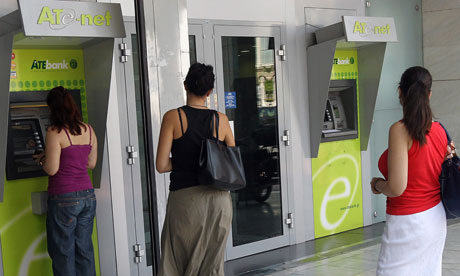guardian.co.uk, Wednesday 23 May 2012 08.49 BST
But while Greek deposits have fallen over two years, those at Portuguese banks have risen to record highs and Spanish and Italian deposits have fallen just 3% and 2%
Customers using an ATM at a branch of the ATEbank in Athens. Photograph: Orestis Panagiotou/EPA
Almost 25% of deposits have been withdrawn from Greek banks in the last two years but outflows have been small from other banking systems inside the so-called periphery, according to Barclays analysts.
While Greek deposits are falling, those at Portuguese lenders have risen to record highs, and Spanish and Italian deposits have fallen 3% and 2% respectively.
"Talk of a possible exit of Greece from the European monetary union has sparked fears about deposit outflows from other peripheral countries, but these concerns are not new and evidence does not indicate material outflows from Spain, Italy, Ireland, and Portugal," the analysts said.
Even so, fears of a Greek exit from the eurozone have sparked debate about whether there should be an EU-wide guarantee for the single currency area. At the moment, the €100,000 deposit guarantees are paid for by national banking systems – which should prevent the need for any deposits to be withdrawn – but there are suggestions that the cost should be spread across the eurozone.
Barclays analysts said this would not make a difference: "An EU-wide deposit guarantee scheme could be on the agenda in upcoming meetings. We believe such a proposal would fail to solve the challenges facing the current European deposit insurance scheme. While it would enhance the creditworthiness of the guarantor, it would still not protect against currency redenomination."
Economist at UBS believe that Greece will remain in the euro because the costs of exit are "excessive" to both Greece and the euro area. Local opinion polls show the majority of Greeks want to remain in the single currency. The UBS economists argue that if Greece considers leaving, the markets and bank depositors will all anticipate the event. "This anticipation of exit would likely result in economic disorder," the UBS analysts said.
"The anticipation, and not the act of leaving, will in all probability lead to the cessation of international trade in the conventional sense, the ability of the government to raise any finance in the markets, and bank runs."
The UBS analysts point out that the concerns are not about the strength of banks themselves. "In the event of a Greek exit, contagion risks clearly exist. There seems to be a great deal of official complacency about the ability of firewalls to prevent this. The risk lies in the contagion of bank runs. Bank runs, if they occur, will likely arise because of existential risks about the euro, rather than solvency or liquidity risks about banking systems," the UBS economists warned.
Quarter of deposits withdrawn from Greek banks | Business | guardian.co.uk
![The [Greek] European Tragedy](https://blogger.googleusercontent.com/img/b/R29vZ2xl/AVvXsEiWKI5s90SFm1wWTk6bs4p7CgslaC2SnYPsrZhb-B-smOufNNCSxCvpBLI9hOB-LsXZjir_PNmEiMk2-E62F3xkg96IoC6QFAaZAnPRTVH340IN9WBRmWJqPkjWlgyRj3zpALp7h6hvA58/s920/GkBack_new.jpg)
